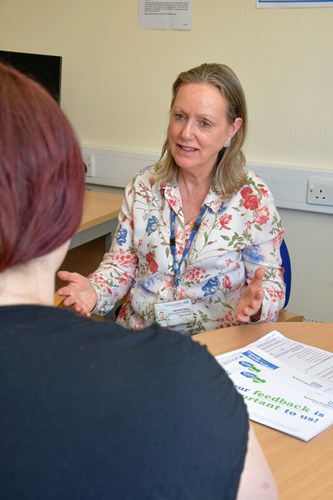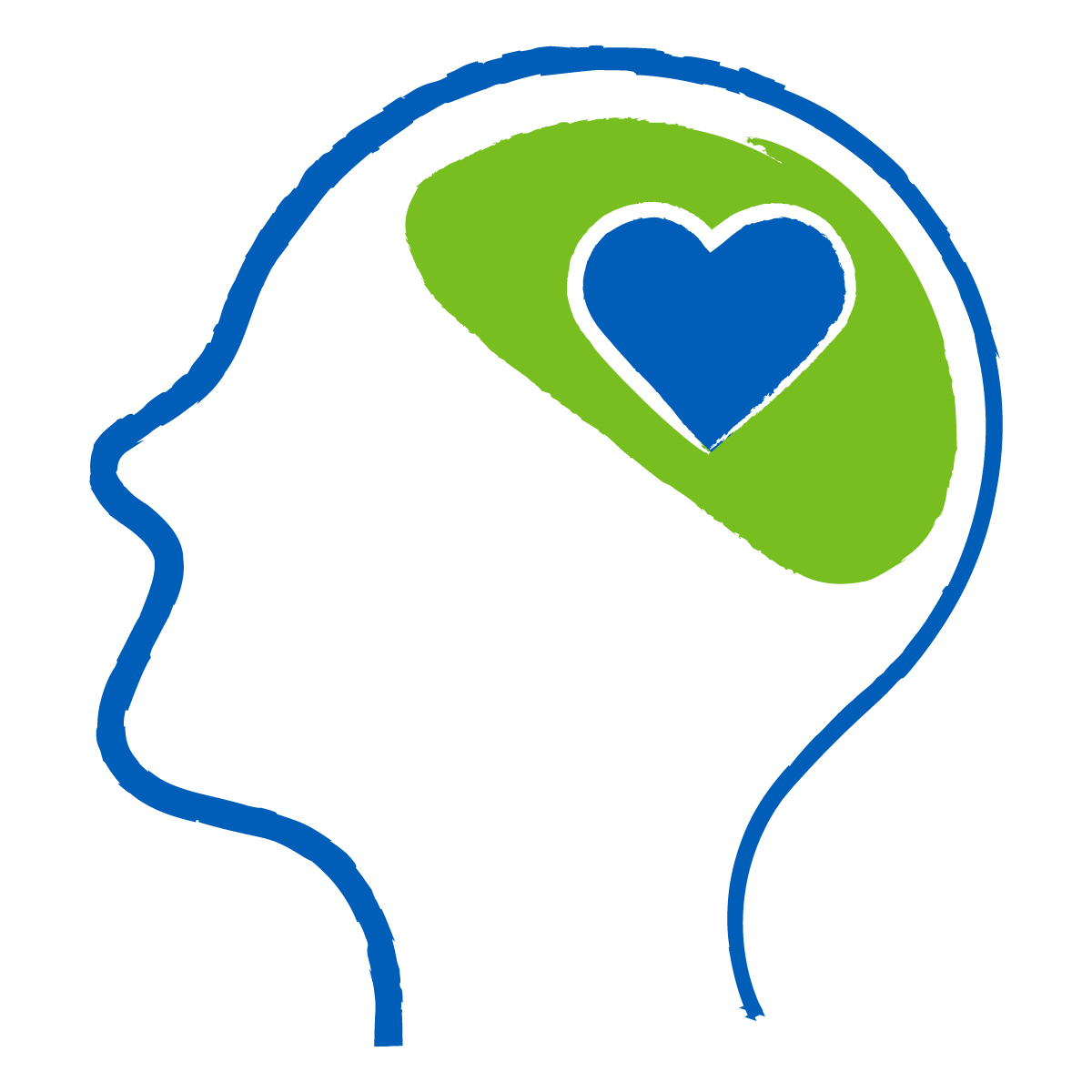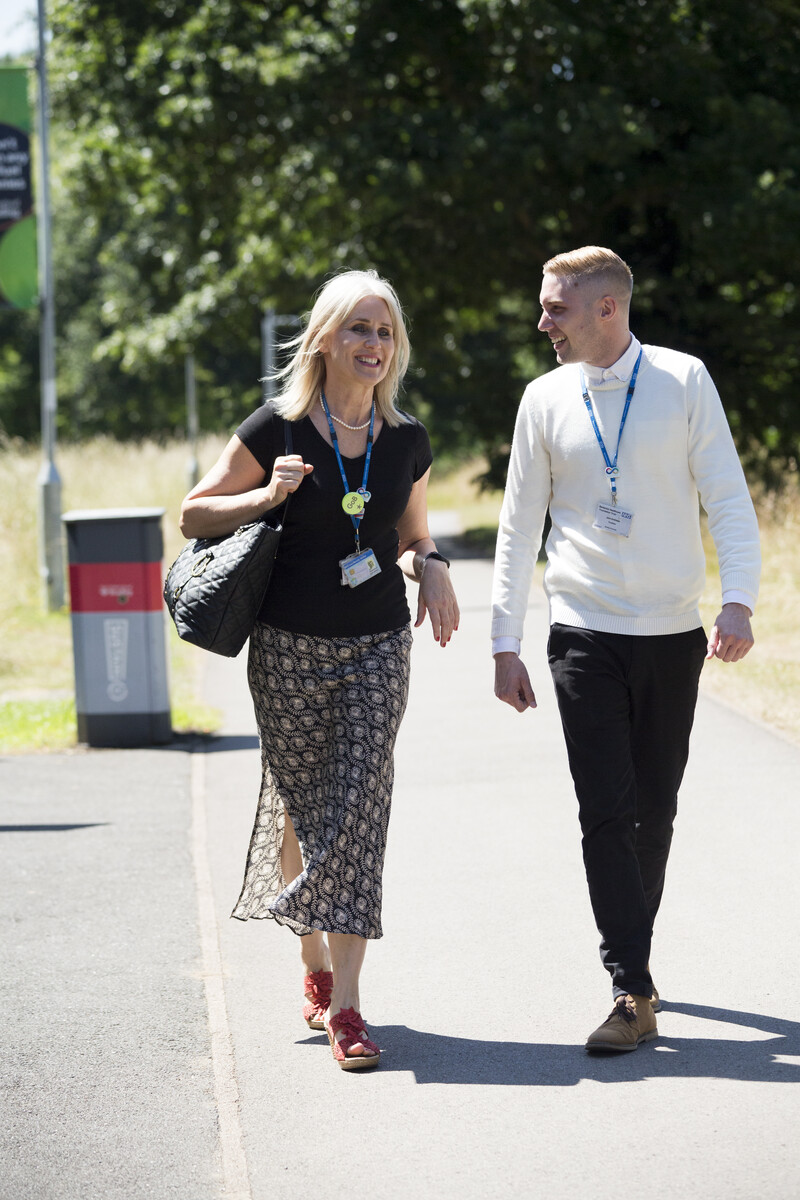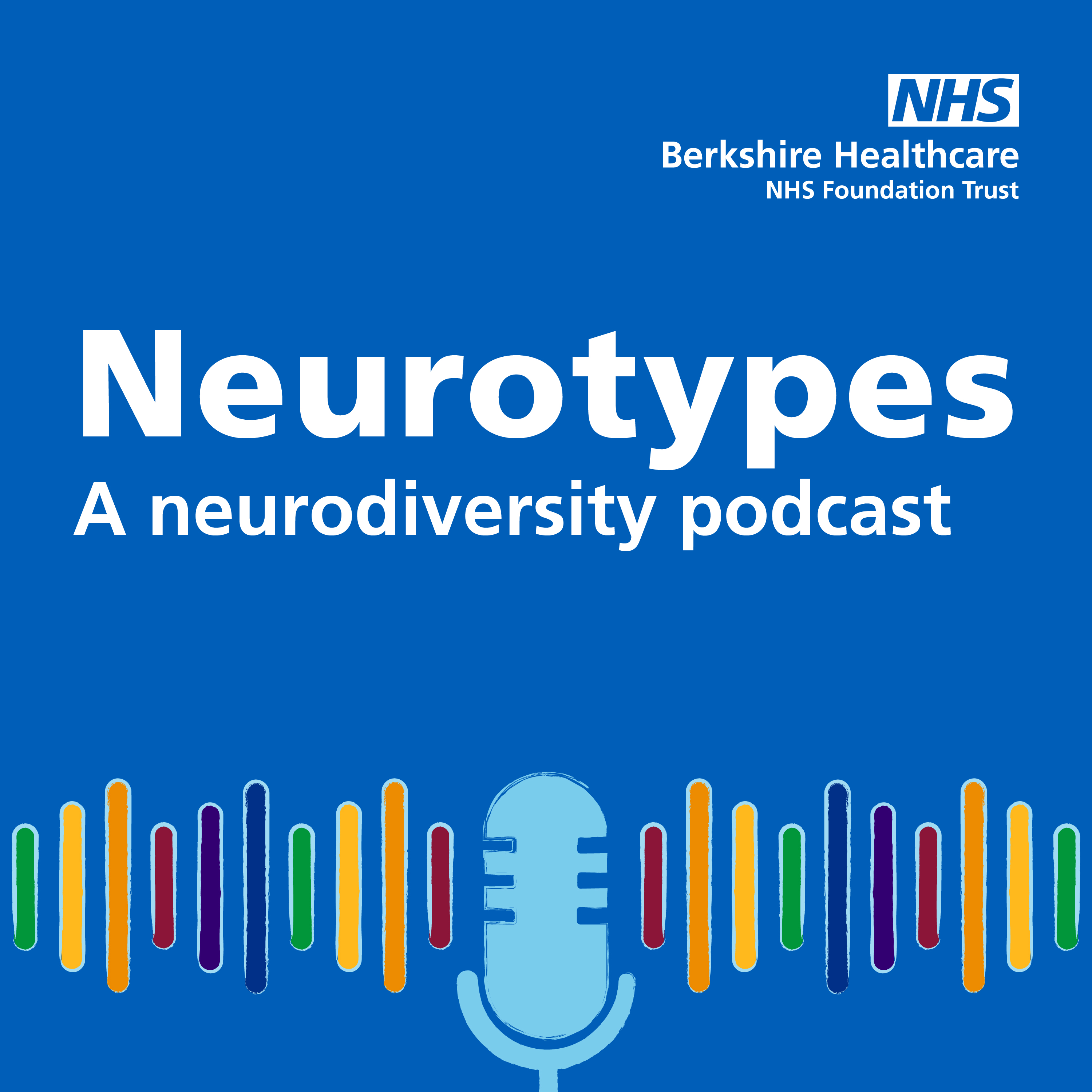Neurodiversity Strategy

Our neurodiversity vision is for everyone at Berkshire Healthcare to recognise, understand and celebrate neurodiversity, and for all neurodivergent people working in, or using our services to be empowered and enabled to have equal access to effective services, support and fulfilling lives.
We’ve developed our neurodiversity strategy to try and address some of these issues. To help us achieve our vision, we are:
- Improving knowledge across the trust so that our teams feel confident they understand neurodiversity and what they can do to help
- Making sure that neurodivergence doesn’t act as a barrier for people when they need to access our services and when those services should be available to them
- Looking at what we can do to improve experience for our neurodivergent staff
We have also employed a neurodiversity advisor/ expert by experience to work with us to deliver our strategy.

"Berkshire Healthcare’s neurodiversity strategy is driven by the view that every human being should be supported to live a happy, healthy life, and to live and work safely, with acceptance, understanding and compassion.
"Not everyone’s experience is like this, or the same. The strengths and needs of neurodivergent people are sometimes invisible or are not understood by the system or neurotypical people within it.
"Neurodivergent people deserve better from Berkshire Healthcare, both people who work for us and people who are cared for by us. Our systems of care and employment have not been designed to comprehensively accommodate and support neurodivergent people.
"It is time for change. Through our own changes and with the support of our community, I am hopeful we may help society to change.
"This is not a strategy for the shelf of good intentions. It is the real story of a better future for neurodivergent people. A future that addresses people’s individual needs and values their unique gifts and contributions to the world. This neurodiversity strategy is the story of the action we are going to take to get to this better future, with neurodivergent people guiding us on our journey together."
Alex Gild – Deputy Chief Executive (executive sponsor)
Neurodiversity is a viewpoint that brain differences are normal and to be expected rather than a deficit. Society is generally designed for neurotypical people, which creates challenges for those who think, understand and experience the world differently.
Neurodivergence includes Attention Deficit Disorder, Autism, Dyslexia, Dyspraxia and other neurological conditions. The main focus of the neurodiversity strategy will be on autism and ADHD but it is certainly not limited to these conditions.

Research tells us that people who are neurodivergent, particularly autistic people, can have poorer health outcomes and a higher overall risk for early mortality – more than double that of the general population in regard to both mental and physical health.
This is something that needs to change.
The Equality Act 2010 requires healthcare providers to make anticipatory and reasonable adjustments to ensure everyone has equal access to their services. But what can we do to make a change and go further than we are already?
There is a requirement for NHS Trusts to have a strategy under diversity legislation, and in addition, the National autism strategy has a deadline between 2021 (short term) and 2024 (long term).
Neurodiversity impacts service users and staff alike within Berkshire Healthcare, which is why we need to increase awareness, training, support and management. Our strategy will be combined with an operational plan to make sure we are offering better support for our neurodivergent staff as well as our service users.
What does the strategy address?
- The strategy addresses the health inequalities, both mental and physical, of service users who are neurodivergent or who are suspected to be. As a result, we hope to improve patient experience and make services more effective and efficient
- Our strategy focuses on autism and Attention Deficit Hyperactive Disorder (ADHD). While there’s not a focus on other neurodivergence, the strategy will highlight the need for understanding and knowledge of onward referral and support for all neurodiversity
- The strategy focuses on the care and treatment of all people of all ages who access our physical and mental health services
- The strategy also supports our neurodivergent workforce, including those who have ADHD, dyslexia, processing difficulties, and other forms of neurodivergence
Why do we need a strategy?
- Neurodivergent people are known to have poorer health outcomes than neurotypical people and have been found to be more at risk of early mortality overall, more than double in the case of both physical and mental ill health. That said, the Equality Act 2010 means healthcare providers must make reasonable adjustments so that everyone has equal access to services
- Neurodivergent people are more likely to be using our services compared to the general population, especially those who are aged between 12-25
- National and local data shows that statistically, a neurodivergent person is more likely to die by suicide than a neurotypical person
- Autistic people and people who have ADHD are more likely to be unemployed or struggle in the workplace if reasonable adjustments aren’t made
Staff have highlighted that they want and need to know more about autism and ADHD so they can support neurodivergent people and their families.
- About 1-2% of the population have been given an autism diagnosis
- As many as 1 in 40 people are estimated to have ADHD
- All of Berkshire Healthcare’s services, including child, adult, physical and mental health services, work with autistic people and people with ADHD
How many neurodivergent people are accessing our services?
In January 2024 trust records showed that in total, 16, 872 people who were diagnosed as neurodivergent, or who were identified as potentially neurodivergent, were accessing our or currently waiting to be seen by our services. The biggest percentage of neurodivergent people accessing services were between the ages of 6-11 (29.32%), 12-15 (19.65%) and 18-25 (15.50%).

In a survey carried out in January/ February 2022, we asked patients, service users and their families to share their thoughts on what we needed to do better. They told us we needed to:
- understand autism and ADHD better
- provide clearer information
- communicate better and listen more
- reduce waiting times
We learnt some important things from the survey:
- Only 39% of respondents felt that the person they met had a good understanding of autism and ADHD
- Just under half (49%) told us there were definite or possible difficulties with accessing services due to sensory processing needs. Only 16%, however, were asked about sensory processing
- 58% said the information provided about their appointment was either not clear or not provided
- Over half (64%) said a lack of information either made or could have made attending their appointment harder
- 19% were given a choice about the type of appointment they had, and 47% said that choice would have been helpful
How can we do better?
Our patients, service users and their families said they want us to listen better and understand neurodiversity, and we heard them loud and clear! Their thoughts included:
- Listen to individuals about their needs, make adjustments and be flexible
- Ask instead of assuming
- Learn more about autism outside stereotypes and preconceived ideas of how able they can/should be.
- Never note that someone ‘doesn’t look autistic’
- Take pause if someone is becoming overwhelmed or things are going wrong
- Listen to service users about their health worries and be compassionate
- Ensure staff are educated when it comes to autism, and in particular, autism in women.
- Listen, offer help and support.
- Prioritise information before appointments and allow time for questions about what to expect.

We need to put our strategy into action so that the vision we have becomes a part of everyday life and practice within Berkshire Healthcare. These are some of the ways we will be doing this:
Working with experts by experience
We know that the people who have the best understanding of neurodiversity are those who are living the experience; that’s why we’re going to work with experts by experience, which means:
- We have employed a neurodiversity advisor/expert by experience to work with us in reviewing, developing, and delivering on our neurodiversity strategy
- We are working with experts by experience to challenge and advise us, to inform decision-making and to facilitate the co-production of quality improvements that raise our standards of care and support for neurodivergent people accessing, or working within, our services.
Improving knowledge and awareness
We want all our staff to have an appropriate understanding of neurodiversity and be confident in supporting the individual needs of neurodivergent service users or staff within Berkshire Healthcare. To achieve this, we have:
- Provided neurodiversity training for our staff
- Made sure our staff know where to find information about reasonable and anticipatory adjustments
- Promote evidence-based information regarding neurodiversity
- Increased general awareness of neurodiversity by celebrating related awareness days and weeks
- Worked with colleagues across Buckinghamshire, Oxfordshire and Berkshire to hold a neuro-inclusive practice conference showcasing and sharing good practice.
- Promoted targeted training such as the National Autism Trainer Programme to our clinical staff.
Making Berkshire Healthcare a great place for neurodivergent people to work
We want managers have clear guidance regarding the support and resources available to neurodivergent staff. We will:
- Work with our neurodivergent staff to understand their experience and the barriers to them identifying as neurodivergent in the workplace
- Recognise the strengths that our neurodivergent colleagues bring to the organisation and enable them to feel confident, safe and supported to talk about being neurodivergent
- Provide the tools and resources for our managers to have confidence in talking to their staff about neurodivergence
- Make anticipatory and reasonable adjustments to ensure that our neurodivergent staff are not disadvantaged in any way
- Ensure that all of our workforce have a positive and informed understanding about neurodiversity so that discrimination in the workplace is decreased
Making sure we’re doing our best and measuring improvements
Taking action is one thing, but additionally, we need to ensure that we are measuring the improvements we’ve made and considering what we can do better. To do this we will:
- Continue in our development of a dashboard for those accessing our services who have a recorded diagnosis of Autism and/or ADHD so they can receive the right support and so we can target areas for training and/or improvement
- Continue to get feedback from those who are neurodivergent as well as their families/carers about how we’re doing
- Check in with staff about how we are supporting them in their awareness and training
- Make sure suicide is a ‘never’ event – with an aim to have 0 recorded deaths by suicide of neurodivergent people in Berkshire
- Review information and how we are doing in the Neurodivergent Steering Group
- Actively listen to, and work with, experts by experience, including our neurodiversity advisor and neurodivergent staff, and their feedback/feelings about our progress
- We are an early adopter of the Neurodiversity Employers Index (NDEI) which enables us to review our position as a neuro-inclusive employer and includes the collation of anonymised feedback from our neurodivergent workforce.

We have a well-established Neurodiversity Steering Group which is made up of a wide range of people, including our Neurodiversity advisor and staff with lived experience. The strategy is also supported by an executive sponsor, our Deputy CEO - Alex Gild.
We’ve been increasing knowledge and awareness about neurodiversity through virtual events and information sharing as well as more specific training for clinicians including:
- Training about adapting interventions for autistic people who are accessing mental health care or experiencing a mental health crisis, facilitated by the Suicide Prevention Steering Group
- Training for staff at Prospect Park Hospital out inpatient service, delivered by AT-Autism including experts by experience and in collaboration with the Buckinghamshire, Oxfordshire and Berkshire West Integrated care board,
- Training for CAMHS staff via CAMHS clinical training seminars,
- An autism and ADHD clinical training programme run by the adult autism and ADHD teams
- Training delivered as part of the Oliver McGowan Autism training pilot.
- The CYPF Neurodiversity service provides Psychological Perspectives in Education, and Primary care (PPEPcare) which is free training for schools, GPs and other agencies and equips settings to provide needs-led support (autism awareness, autism and mental health and ADHD modules)
- Clinical staff have accessed training from the National Autism Trainer Programme, and we will be recording a bank of trainers to spread that learning throughout our mental health services.
- We have shared training on supporting neurodivergent colleagues which is supported by a neurodiversity toolkit for managers and colleagues.
We will be continuing to identify and support training across the Trust.
We have developed two neurodiversity pages on our staff intranet, one focused on clinical practice and information and one for supporting staff, which contain up-to-date neurodiversity news, access to training and relevant information relating to neuro-inclusive practice and employment.
We’ve created a neurodiversity passport in collaboration with experts by experience and colleagues in Buckinghamshire and Oxfordshire.
Experts by experience have reviewed the physical environment at Prospect Park Hospital and given valuable feedback.
Services have worked with experts by experience to improve the accessibility of our leaflets, letters and the way our therapeutic sessions are delivered.
Autism and ADHD assessments
Reducing the waits for autism and ADHD assessment remains a top priority both for us and for our commissioners (the bodies responsible for planning and funding services in their local area).
The CYPF Neurodiversity service has received significant additional investment from the commissioners in East and West Berkshire with the aim of achieving a significant reduction in wait times. As a result, we have been able to expand the teams and work in partnership with external providers to provide autism and ADHD assessments on our behalf as well as initiating ADHD medication.
In the last year, we have approximately doubled the number of appointments offered and numbers waiting the longest for appointments has significantly reduced.
Referral rates continue to increase, and we continue to work with commissioners and in partnership with private providers. We also continue to work across the local system to embed a culture shift of needs led (rather than diagnosis dependent) support and to promote an understanding of neurodiversity.
We are working on a range of initiatives to increase the number of appointments available and to increase the flow of children and young people through the service. The aim is to both reduce the wait for assessment, but also to ensure that help for children, young people and families is available as early as possible based on need.
The CYPF Neurodiversity Service supported the set-up of the East Berkshire Neurodiversity Network. The network launched in May 2021 to connect individuals and organisations and change how we think about neurodiversity, with parents/carers and experts by experience central to the network.

Neurotypes podcast
Neurotypes is a neurodiversity podcast, an opportunity for you to hear authentic stories and valuable insights from both neurodivergent people and NHS clinicians who specialise in neurodiversity.
In each episode, we cover topics such as diagnosis, medication, and the unique experiences of neurodivergent people, with the aim of supporting anyone who is currently waiting for an assessment and those who have recently received a diagnosis.